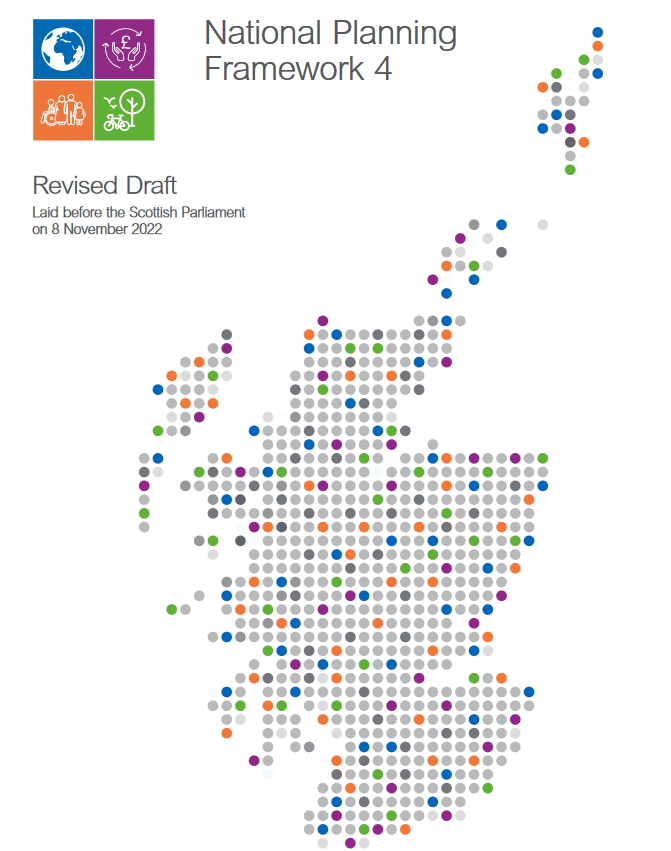Revised draft National Planning Framework 4 published

The NPF4 document was tabled in the Scottish Parliament yesterday
Developments which reduce carbon emissions to tackle climate change and restore nature would be promoted under finalised proposals for long term planning reform.
The revised draft National Planning Framework 4 (NPF4) sets out sustainable policies against which planning applications would be assessed for the next decade.
It has been tabled in the Scottish Parliament against the backdrop of crucial intergovernmental climate talks at COP27 in Egypt and seeks to deliver a new and bold direction, with a shift in culture and approach to planning in Scotland.
Proposals in NPF4 include:
- enabling more renewable energy generation, outside National Parks and National Scenic Areas, to support the transition away from reliance on fossil fuels
- supporting emerging low-carbon and zero emissions technologies – including hydrogen and carbon capture – and developments on land that unlock the transformative potential of offshore renewable energy, such as expansion of the electricity grid. Waste incineration facilities would be highly unlikely to receive permission
- facilitating creation of cycling or walking routes, low carbon transport, more green spaces and opportunities for play, culture and tourism
- helping rural communities grow by enabling more local homes and encouraging a more diverse rural economy
- regenerating city and town centres to help them adapt to economic change while enabling people to access shops, schools and workplaces within a 20 minute walk or cycle
- adopting a planned and evidence-based approach to delivering good quality and affordable homes that benefit communities.
Planning minister Tom Arthur said: “The window of opportunity to act to reduce emissions and adapt to already locked in changes is narrowing. Our statutory and moral obligation to tackle climate change means change is necessary and urgent.
“This final version of the Framework makes clear that we won’t compromise on climate change. It also clarifies what is to be delivered, and how. And it is now clear through the weighting to be applied to different policies, that the climate and nature crises are the priority.
“It is timely that we have tabled final proposals during COP27, as we set out to do when Glasgow hosted COP26 last year. This shows that Scotland’s ambition and commitment to delivering on international calls for action is unwavering.
“There is now a clear expectation of the role that planning must play in delivering the expansion of renewable energy needed to realise the just transition from reliance on fossil fuels.
“This Framework creates the foundation upon which to build the fairer, greener Scotland we want to see for the benefit of future generations.”
Sarah Baillie, who leads the planning & infrastructure consenting team in Scotland at international law firm Addleshaw Goddard, and is also co-lead of the firm’s Power Sector, said the revised draft has gone some way to alleviate concerns raised previously by the energy sector but tensions remain as to whether housing delivery numbers fall short of what is required.
Ms Baillie said: “Today’s blueprint laid before MSPs signals a new approach to planning in order to achieve a net-zero Scotland by 2045. With enhanced legal status it will play a pivotal role in land use decision making, in order to tackle and adapt to the changing climate, restore biodiversity loss, improve health and wellbeing, build up the economy and create great places.
“In 2020, the Scottish Government made clear that a key objective was that the planning system must be ‘rebalanced’ so that climate change is a primary guiding principle for all plans and decisions. This was an express statement that significant change in the status quo was needed and must be reflected in consenting decisions, with planning becoming an enabler of the net zero transition. However, it was felt that the draft policy fell far short of that billing and it was unclear and ambiguous as to how decision-makers would deal with the ‘Climate Emergency’ as an absolute priority in striking a planning balance.
“A number of sectors, especially across property and energy, felt that the text was complex, disjointed and at times contradictory. The expectation was that the draft NPF4 would set out an enabling policy framework to deliver on ambitious targets. However, many of the changes proposed would have actively undermined renewables consenting processes and the development and property industry felt that the framework should have more ambition to help the planning system as a platform for much needed investment into the built environment.
“Three rounds of extensive public consultation have been undertaken to inform the preparation of NPF4, together with parliamentary scrutiny of the draft NPF4 during 2022. As a result, this final version looks very different but the feel and policy intent remains – putting climate change at the forefront and centre of all decision making, with a further new ‘Climate and Nature Crisis’ policy introduced to underpin this.
“The message is for the planning system to get behind renewables and that Scotland will look a very different place in the future. The spatial strategy has also been reworked based on three pillars of Sustainable, Liveable and Productive Places with different development priorities across Scotland. The strengthening of language is also welcomed in order to bring clarity for decision makers and predictability for investors but it will need further consideration. Obviously, if it leads to faster decisions and perhaps avoiding expensive and time-consuming public local inquiries, then any developer or investor will welcome that direction. A new Planning, Infrastructure & Place Advisory Group has also been announced which will be critical to underpinning an infrastructure first approach in order to facilitate development and investment.
“The policy document will undertake further scrutiny over the forthcoming weeks. Tensions look set to remain as to whether housing delivery numbers fall short of what is required to address the housing crisis and whether there is enough policy ambition to enable and attract much required property investment in our towns and cities. There is no doubt that Planners will also face a dramatic shift in culture and approach. However, with the number of planners falling by a third since 2009 and with increased responsibilities, questions will continue over resourcing.
“There is certainly no quick fix but with the embedment of climate change at the heart of the planning system, there is clearly an opportunity to galvanise future generations into the profession on a subject they appear to be so passionate about.”
The Royal Town Planning Institute (RTPI) Scotland has hailed the publication as a “significant milestone” in ambitions to tackle climate change.
Andrew Trigger, RTPI Scotland’s convenor, said: “We are pleased to see Scottish Government publish this important document on World Town Planning Day and in the week of COP27 that rightly places planning at the heart of our drive towards net zero. This Framework will usher in a new plan-led era that can make sure our towns and cities are greener, healthier and more vibrant.
“We hope that, through this period of parliamentary consideration and debate, MSPs recognise the important role that the Framework and planning can play, ensuring it is at the forefront in Scotland’s green future.
“RTPI Scotland is committed to working constructively and positively with government, Parliament and stakeholders in the run-up to the final parliamentary debate and vote. However, we are acutely aware of the significant budgetary cuts experienced by planning departments in recent years alongside chronic understaffing. To make this vision of Scotland to 2050 a reality, we need to provide the appropriate resources to our planning departments to prepare Local Development Plans and manage planning applications to guide development appropriately.”
Councillor Gail Macgregor, COSLA’s Environment and Economy spokesperson, added: “Analysis and scrutiny will be required to comment on the content of NPF4, due to the detail and complexity of the framework. COSLA has previously made clear that we support a National Planning Framework which is consistent with our existing priorities, particularly the Just Transition to a Net Zero Economy no later than 2045 and place making to improve the wellbeing of Scotland’s communities.
“We welcome moves in the NPF4 to achieve these aims, but the framework alone is not enough and local authorities will require the resources and flexibility of full cost recovery to effectively and efficiently deliver its aims.”





















